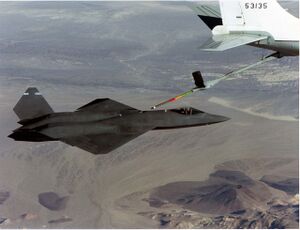K-40: Difference between revisions
(Created page with "{{Infobox Aircraft |name = Type 40 fighter |type = {{wp|Fighter_aircraft|Fighter}} |national origin =...") |
No edit summary |
||
| Line 4: | Line 4: | ||
|national origin = [[Kalaronian Republic of Clans]] | |national origin = [[Kalaronian Republic of Clans]] | ||
|manufacturer = | |manufacturer = | ||
|image = File: | |image = File:1280px-YF-23 refueling.jpg | ||
|caption = Three common Type 40 variants spanning the course of the war | |caption = Three common Type 40 variants spanning the course of the war | ||
|designer = Chikai Aviation Company | |designer = Chikai Aviation Company | ||
Revision as of 03:12, 18 September 2020
| Type 40 fighter | |
|---|---|
 Three common Type 40 variants spanning the course of the war | |
| General information | |
| Type | Fighter |
| Designer | Chikai Aviation Company |
| Status | withdrawn from service |
| History | |
| Manufactured | 1939-1945 |
| Introduction date | 1940 |
The Chikai Type 40 fighter, Chikai sallyŏng-sik jŏntugi) was a Menghean fighter aircraft designed during the late 1930s and introduced in 1940. It was powered by the Donghae Gi-27 12-cylinder inverted-V engine,}, giving it a sleek appearance and very good performance for its time. With over 5,500 units produced between 1940 and 1945, the Type 40 was the most widely produced Menghean fighter of the war, and it became a lasting icon of Menghe's military effort.
When it arrived on the front lines in early 1940, the Chikai Type 40 represented a radical improvement over all Menghean fighter aircraft already in service, including the biplane and the Striker-Fighter purchased from. Allied pilots considered it a formidable opponent with versatile flight characteristics, balancing speed, maneuverability, armament, and protection. In the right hands, it could outperform contemporary Allied fighters like the , and most of Menghe's highest-scoring aces scored their kills in the Type 40. As the war progressed, the Type 40 received new upgrades to its engine and armament, keeping it moderately competitive with later Allied fighters, though bombing attacks on its production facilities slowed the delivery of new airframes.
Background
Development
Design
Operational history
Early service
Anti-bomber operations
Post-war service
Variants
The prototype flown in the 1939 fighter competition was designated Chikai WH 25, with WH indicating wŏnhyŏng (prototype). Six were built. Its armament consisted of four 7.5mm machine guns: two above the nose, and one in each wing. Each gun was fed from a 500-round belt.
Type 40-I
Type 40-II
Type 40-III
Type 40-IV
Type 40-V
Specifications (Type 40-I)
<imgur thumb="yes" w="500">34yFV4y.png</imgur> General Characteristics
- Crew:
- Length:
- Wingspan:
- Height:
- Wing Area:
- Empty Weight:
- Loaded Weight:
- Powerplant:
Performance
- Maximum Speed:
- Range:
- Service Ceiling:
- Rate of Climb:
- Wing Loading:
- Power-to-Mass ratio:
Armament
- Guns:
- 2x forward-firing
- 2x forward-firing
- Bombs: